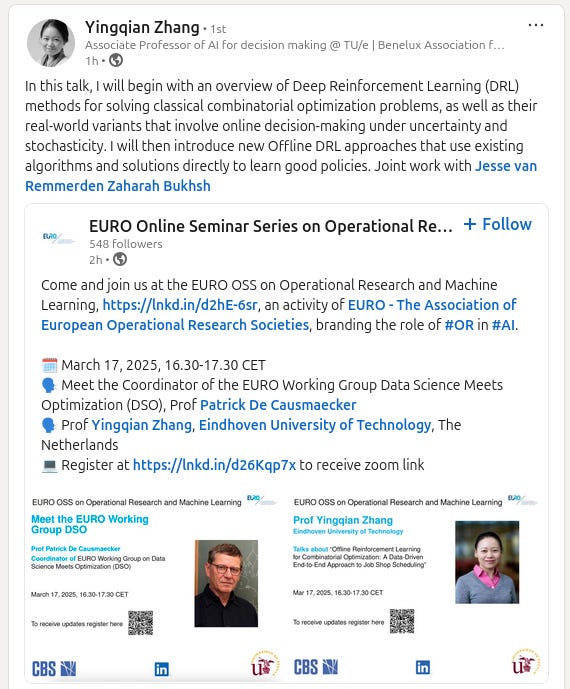📈 Implementation is King, Deep RL for combinatorial optimization, and the third wave of analytics
Local Optimum: short, imperfect-yet-useful ideas - Edition #1
Hi 👋,
I’m trying something new.
Every Thursday, I’ll be sending you Local Optimum: a short, imperfect-yet-useful collection of ideas related to optimization, decision-making, and applied Operations Research.
Why Local Optimum? Because, just like in real-world problems, we don’t always need the perfect, global solution. Sometimes, a smart, practical step forward is enough.
Each Thursday, you’ll get:
✅ One quick insight: a short but thought-provoking idea.
✅ One external resource: something interesting I’ve read lately.
✅ One fresh take on a past post: because good ideas deserve a second look.
It’s a light, digestible format so you can learn something valuable in just a few minutes.
I was going to start next Thursday, but I couldn’t resist it and here we are.
Ready? Let’s get started! 🪂
1) 👑 Implementation is King
Operations Research doesn't stop at telling you what could happen; it provides a roadmap for how to make it happen.
By optimizing resources and designing actionable plans, OR ensures that the insights from analytics are not just theoretical but are translated into real-world implementations.
2) 🤖 Deep RL for combinatorial optimization
I’ve seen it many times, and you probably have too.
Since Reinforcement Learning is based on maximizing a function, it naturally resembles a classical optimization problem.
That’s why many have attempted to use RL for solving combinatorial optimization problems.
But does it actually work? Or not?
Find out on March 17th 👇(click on the image below to go to the post)
3) 🌊 The third wave of analytics
Practicality beats theoretical perfection in prescriptive analytics.
Businesses don’t need the most mathematically optimal model, they need solutions that work within real-world constraints and deliver results.
A highly complex optimization model might maximize efficiency on paper, but if it’s too complicated to implement, it’s useless.
A simpler, actionable model can drive immediate improvements. ✅
In an era where analytics is becoming a commodity, the real differentiator is execution. Success doesn’t come from just building models—it comes from deploying them effectively. 🏗️
Simplifying complexity makes analytics more accessible, adoptable, and scalable.
That’s why I wrote about the maturity of businesses, technology, and the increasing demand for OR experts in this full article 👇
How do you design a great interview process?
Next Monday, I’ll share how I approach interviews from the interviewer’s perspective. How do you make the process both efficient and insightful?
I’ll cover:
🎯 The core competencies to evaluate
📝 Desiging an effective interview process
✅ A simple 2-interview approach that works
If you hire (or plan to), this will be useful. See you Monday!
And that’s it for today!
If you’re finding this newsletter valuable, consider doing any of these:
1) 📣 Advertise in Feasible. I’m always looking for great products and services that I can recommend to subscribers. If you are interested in reaching an audience of Operations Research Engineers, you may want to advertise here. Just 📨 answer this email 📨 and I’ll get back to you.
2) 📤 Share the newsletter with a friend, and earn rewards in compensation.
If you have any comments or feedback, just respond to this email!
Have a nice day ahead ☀️
Borja.






